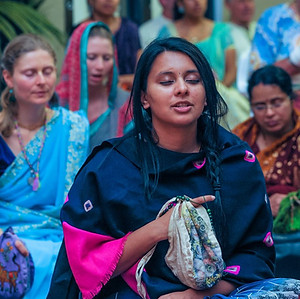
Mantra
Meditation
What is a Mantra?
The word mantra comes from the Sanskrit language. Man refers to the mind and tra (or trayate) means to protect. Mantras are prescribed sacred sound vibrations which have the spiritual potency to protect and free the mind from anxieties of material life.
Even ordinary sound vibrations have the capacity to alter our state of consciousness. When we sleep at night we drift off into a state of external unawareness only to be reawakened by the sound of an alarm. In a similar way, mantras are transcendental vibrations which reawaken our consciousness from identifying ourself to be the material body to realising that we are the soul inside.

Mantra Meditation
Mantra meditation is a time-tested spiritual practice to reawaken and rejuvenate one's consciousness. Although the style may vary, mantra meditation plays an important role in almost all of the world's major religious systems. The mantra meditation methodology involves focussing and re-focussing our busy and ever-restless mind on the sound vibration of a mantra through chanting and attentive hearing.
In the bhakti yoga tradition, two types of mantra meditation are prescribed. One process is called japa and involves softly repeating a mantra to oneself while fingering a japa mala or meditation beads which are strung with 108 beads. The second process is called kirtan and involves chanting and singing mantras together in a group in a call and response fashion accompanied by musical instruments. Both japa and kirtan are complimentary and enhance each other.


Personal Japa Meditation
Group Kirtan Meditation
The "Great" Mantra
Out of many thousands of mantras, the Vedas specifically recommend the chanting of the Hare Krishna Maha Mantra. The word maha means "great" and so the Hare Krishna Maha Mantra is considered by the Vedas to be the greatest and most potent mantra for the present age. The Maha Mantra has the capacity to clean the heart from all misgivings and immerse and uplift the mind from material entanglement. The Maha Mantra connects one directly with Krishna and gives the practitioner experiential evidence of the spiritual reality.
The Hare Krishna Maha Mantra consists of three words "Hare", "Krishna" and "Rama". Krishna means "the supremely beautiful One". Rama is another name of Krishna and means "the reservoir of all pleasure and bliss". Hare refers to the "all-attractive and powerful energy" of Krishna.
Hare Krishna Hare Krishna
Krishna Krishna Hare Hare
Hare Rama Hare Rama
Rama Rama Hare Hare
Hare, is pronounced “HUH-ray”. Krishna, is pronounced “KRISH-na” and Rama, is pronounced “RAH-muh”. The Hare Krishna Maha Mantra is recited both as japa and sung through kirtan by practitioners of Krishna Consciousness.

"The transcendental vibration established by the chanting of Hare Krishna Hare Krishna Krishna Krishna Hare Hare, Hare Rama Hare Rama Rama Rama Hare Hare is the sublime method for reviving our transcendental consciousness. As living spiritual souls, we are all originally Krishna Conscious entities, but due to our association with matter—since time immemorial—our consciousness is now adulterated by the material atmosphere. The material atmosphere, in which we are now living, is called Maya, or illusion. Maya means that which is not. And what is this illusion? The illusion is that we are all trying to be lords of material nature, while actually we are under the grip of the stringent laws of material nature. When a servant artificially tries to imitate the all powerful master, it is called illusion. We are trying to exploit the resources of material nature, but actually we are becoming more and more entangled in her complexities. Therefore, we are engaged in a hard struggle to conquer the stringent laws of material nature, but we are ever more dependent on it. This illusory struggle against material nature can be stopped at once by revival of our eternal Krishna Consciousness.
Hare Krishna, Hare Krishna, Krishna Krishna, Hare Hare is the transcendental process for reviving this original pure consciousness. By chanting this transcendental vibration, we can cleanse away all misgivings within our hearts. The basic principle of all such misgivings is the false consciousness that I am the lord of all I survey." A.C. Bhaktivedanta Swami - Guru, Bhakti Yoga Teacher, Author

"The response that comes from chanting is in the form of bliss, or spiritual happiness, which is a much higher taste than any happiness found here in the material world. That’s why I say that the more you do it, the more you don’t want to stop, because it feels so nice and peaceful.
The word Hare is the word that calls upon the energy that’s around the Lord. If you say the mantra enough, you build up an identification with God. God’s all happiness, all bliss, and by chanting His names we connect with Him. So it’s really a process of actually having a realization of God, which all becomes clear with the expanded state of consciousness that develops when you chant. Like I said in the introduction I wrote for Prabhupada’s Krsna book some years ago, “If there’s a God, I want to see Him. It’s pointless to believe in something without proof, and Krishna consciousness and meditation are methods where you can actually obtain God perception."
George Harrison - Musician, Singer-Songwriter

"The ability to handle stress increases with the practice of meditation. In a culture like ours in which inner, spiritual growth is totally neglected in favor of materialistic pursuits, we might have something to learn from the Hare Krishna devotees' meditational practices.”
Daniel Goleman - Author, Science Journalist



